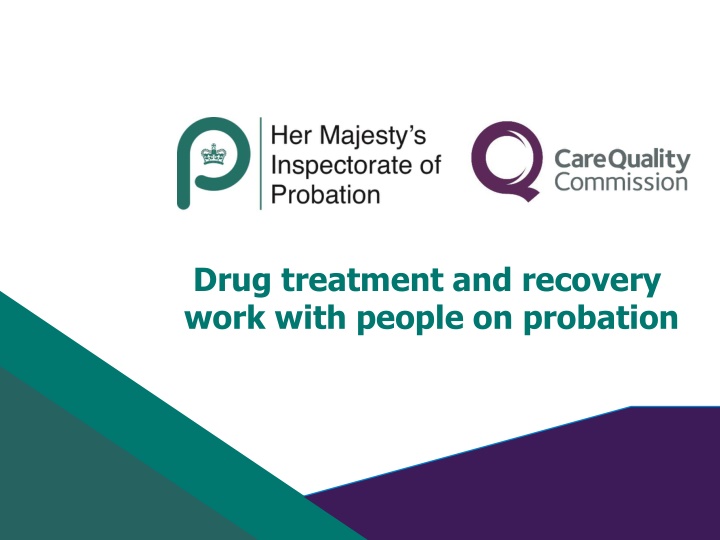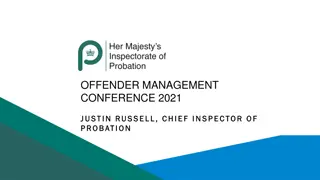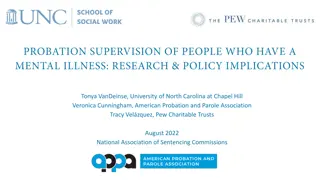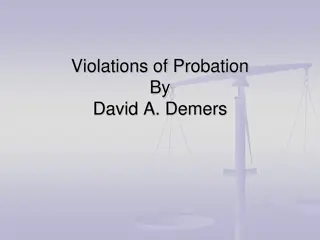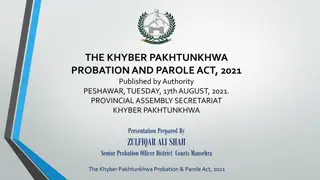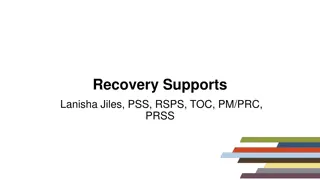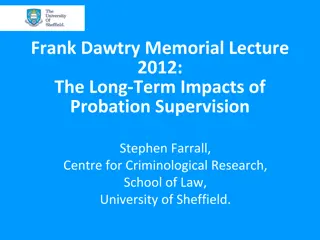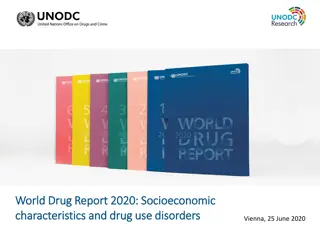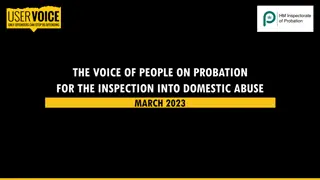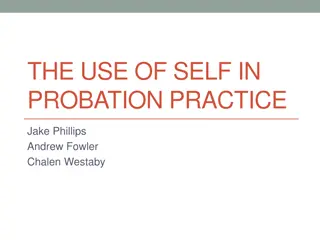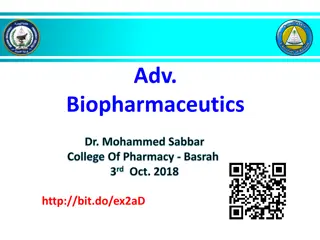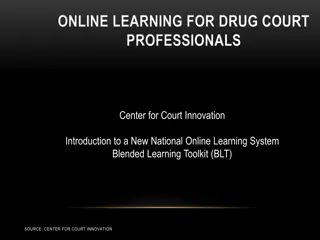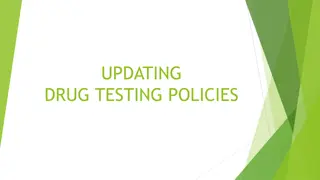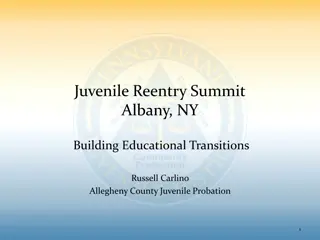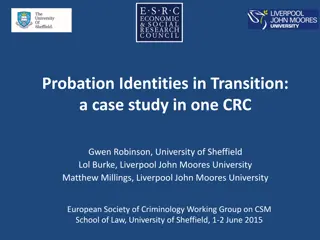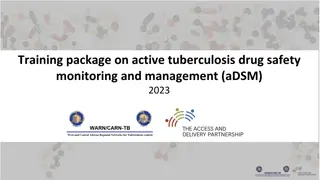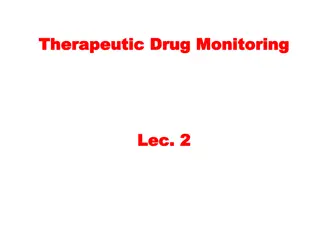Drug Treatment and Recovery for People on Probation
Drug treatment and recovery play a crucial role in addressing substance misuse among individuals on probation, reducing drug-related crimes, and enhancing public safety. With a significant number of individuals in the criminal justice system experiencing drug problems, effective interventions are essential to support their rehabilitation and successful reintegration into society. Inspection methodologies, quantitative data analysis, and key themes such as strategy, partnership work, casework, and harm reduction further underscore the importance of evidence-based practices in this field.
Download Presentation

Please find below an Image/Link to download the presentation.
The content on the website is provided AS IS for your information and personal use only. It may not be sold, licensed, or shared on other websites without obtaining consent from the author.If you encounter any issues during the download, it is possible that the publisher has removed the file from their server.
You are allowed to download the files provided on this website for personal or commercial use, subject to the condition that they are used lawfully. All files are the property of their respective owners.
The content on the website is provided AS IS for your information and personal use only. It may not be sold, licensed, or shared on other websites without obtaining consent from the author.
E N D
Presentation Transcript
Drug treatment and recovery work with people on probation
DRUG USE, CRIME AND PROBATION 300,000 heroin and crack users are responsible for half of all acquisitive crime and cost the public purse 9 billion a year. between April 2019 and March 2020, there were 51,006 adults in treatment for substance misuse within a prison setting Of 156,000 people currently on probation in the community we estimate c75,000 have a drugs problem 4,561 deaths from drug related poisoning in 2020 the highest number since records began in 1993 and 60% up since 2012.
INSPECTION METHODOLOGY case inspection of 60 cases HMI Probation inspection plus Care Quality Commission / Healthcare Inspectorate Wales inspection of drug casework; includes interview with responsible officer / drugs worker six fieldwork sites key observations from meetings with commissioners, community safety partnerships, police & crime commissioners, adult safeguarding boards, judges, prison drug and resettlement staff and drug service providers we co-produced the inspection methodology with CQC and their partner organisation Choice Support whose experts-by-experience gathered insight from people on probation
QUANTITATIVE DATA Information in advance includes performance information from drug service providers Data work with: Public Health England (National Drug Treatment Monitoring System) Welsh Government HMPPS Surveys probation providers, Magistrates commissioners (public health departments in England, Area Planning Boards in Wales).
INSPECTION OUTLINE: FIELDWORK SITES ADDER sites Middlesbrough Blackpool East Sussex CQC joint inspection CSTR pilot sites Manchester Lambeth Swansea, Neath & Post Talbot HIW joint inspection ADDER: CSTR: Addiction, Diversion, Disruption, Community Sentence Enforcement and Recovery Treatment Requirements
KEY THEMES Strategy and background policy context Partnership and court work Casework and DRRs Resettlement and treatment after custody Reducing harm from drugs You can find the report here: https://www.justiceinspectorates.gov.uk/hmiprobation/i nspections/drug-treatment/
STRATEGY AND POLICY CONTEXT No co-ordinated national or local strategy in England to address drug misuse for people on probation at national or local level. Treatment providers and probation operating in separate silos. Budget cuts and loss of ring-fencing since the Drug Intervention Programme shut in 2013 mean criminal justice treatment pathways have withered on the vine. Half of English commissioners told us they d had budget cuts over 25% in past five years. Recent investment (Op ADDER and CSTR) is welcome but Dame Carol Black estimates an additional 552m a year is needed to meet treatment needs.
COURT WORK Not enough people are getting assessed for treatment in court Very few specialist assessments are being undertaken at court, leading to few recommendations for treatment. DRR numbers are down 75% since 2008. Although 75,000 people on probation have a drug problem, NDTMS data shows the probation service made less than 3,000 referrals to specialist treatment in 2020 Drug rehabilitation requirements (DRRs) Sentencers are positive about DRRs and see the benefits of drug testing and formal court review, but pre-sentence reports were sought in only half of the cases we inspected. Some sentencers included DRRs in their sentences without any sort of pre- sentence assessment report Of the 450 magistrates responding to our survey, 42% were unsure of the availability of local drugs services or drug testing and almost 60% were not confident in the ability of CRCs to deliver drugs interventions
PARTNERSHIPS Fragmentation Commissioned services are often working in isolation of probation providers. We saw a lack of joint planning and joint delivery in all fieldwork sites. Information exchange Information about assessments, plans and progress is not exchanged effectively across agencies. Of the 60 cases we looked at only six included drugs services enough in the planning process and information about assessment was shared in only 12. Recording is poor: with key pieces of information, such as test results or attendance at appointments, not clearly noted. Specialism, co-location and integration There are few specialist teams focussing on drugs (only 10% of probation providers said they had one) but where it happens, for example in IOM teams, co-location is welcomed. Mental health is a key issue, despite impressive facilities in some areas, not enough people were getting help with their mental health.
CASEWORK The standard of assessment and planning in relation to drugs was not good enough in around half of the cases we reviewed. The case notes reviewed did not have a clearly devised treatment/recovery plan nor include a clear record of what engagement with drug treatment services was required Offence-focused and therapeutic work was underused - structured interventions appear to have fallen out of use (not helped by impact of Covid) Drug workers were offering few psychosocial interventions, with the focus instead on prescriptions for people needing opiate-substitution therapy Overall, there was little work directed towards recovery and too few probation practitioners were skilled in this work (only 13% knew about models of recovery).. The goal is too often maintenance in treatment, with too little aspiration for people to find work and economic stability.
TRENDS IN DRUG REHABILITATION REQUIREMENTS SINCE 2005
DRUG REHABILITATION REQUIREMENT USE AND OUTCOMES Only half of DRRs which started in Jan to March 2020 were successfully completed Very diluted and poor delivery. Drugs agencies and probation shared information to bring about effective assessment in only half of the 23 DRRs we inspected. Treatment plans were only shared between probation and the drugs agencies in five cases, leaving real gaps in communication and professional practice. In only six cases was there a sufficient record of what engagement was required with drug treatment services. It was impossible to see how many appointments have been kept with drug agencies and whether this was in line with sentence plans. Nine out of ten DRRs had no proper court oversight. Only 10 cases out of the 60 we reviewed received any recorded drug testing, despite our sample containing 23 DRR cases
DRUG TESTING Drug testing is being used too infrequently. Covid has had an impact but this issue predates the pandemic, with ongoing disputes about who should pay for them Information on drug tests is not easily accessible on probation case management systems, and recording practice is not consistent. It wasn t possible to determine the volume of drug testing currently underway Covid-19 social distancing rules meant that testing had stopped altogether during the pandemic. Now restarted but still a long way to go and legislation severely restricts the circumstances it can be used with people on probation Our interviews with people on probation suggested that some of them expect and want to be tested: I ve never been tested by probation. I got 10 years for a drug-related crime, and I thought that would have been a regular thing once I got released but no, never been asked to do a test. I ve had a couple of tests which came back clean. Which was a great feeling for me. I wanted to show everyone I was serious about getting clean and turning my life around. That s what the testing means to me. Truth, honesty and determination to stay away from the white stuff [crack cocaine].
RESETTLEMENT KEY FINDINGS Of 26 people who were released from prison in our six fieldwork areas in the 12 months to March 2020 who had been assessed as needing follow-up drug treatment in the community, only 10 (38 per cent) were supported sufficiently to access these services. Some people had no prescription for opiate-substitution medication arranged on their release from custody Health and justice services tend to work in isolation and the agencies do not share enough information to ensure continuity of care. In South Wales, the same treatment provider serves both prisons and those released into the community, significantly improving join up. More could also be done to build on recovery work in prisons - eg by linking people to peer-led, mutual aid such as Alcoholics or Narcotics Anonymous after release Licence conditions to manage people after their release were not applied consistently. We found some cases where licence conditions should have been applied and others where the requirement for treatment was not proportionate or appropriate.
RESETTLEMENT FEEDBACK I got lots of support, to be honest, from the probation team and the workers at the approved address I was sent to. They helped me with accessing the benefits department, food banks, phone calls and the support was there, and it really helped me get back on my feet when I was first released. So, I feel that they did communicate with each other and it helped me to get closer to home eventually. I was fully supported by everyone involved and that felt good Others weren t so well supported It was crap really. At first, I was homeless for quite a while. I ve got mental health issues, I m epileptic and a heroin addict. I eventually got housed through Bromley Borough Council in this hostel I m in now. But it s miles away from my family and friends and support networks.
KEY FINDINGS: REDUCING HARMS
SUMMARY OF RECOMMENDATIONS The Ministry of Justice; the Department of Health and Social Care; Welsh Government; Her Majesty s Prison and Probation Service and Local Criminal Justice Boards, working with drug services to: integrated health and justice co- commissioning models a joint working culture between the relevant professional bodies the number of people accessing drug treatment increase evaluate build joined-up strategies and policies address drug misuse for people on probation drug-misuse assessments at court information exchange specialist effective ensure and publish outcomes for people on probation with a drugs problem interventions to tackle drug addiction and support recovery evidence -based place- based joint effort to improve drug services to reduce crime measure
SUMMARY OF RECOMMENDATIONS (continued) a probation drugs strategy and related policies with: implement effective governance better data and information systems to collect profile and needs data, a specific field to record drug test results increased use of regular drug testing a drug semi-specialist model with partner agencies improved training to staff on drugs, how to work with trauma and recovery the safety of people under probation supervision improve reduce the number of drug-related deaths improve develop learning programmes for staff to deliver effective harm reduction and overdose prevention knowledge and increase activity to safeguard all adults at risk.
NEXT STEPS HMPPS are required to produce an action plan to respond to our recommendations and findings The Government has promised a new cross-Government Drugs Strategy by the end of this year The Spending Review provides an opportunity for the government to respond to Dame Carol Black s review and our own findings HMI Probation will be publishing an effective practice guide highlighting the more positive initiatives we saw during our fieldwork. We ll continue to inspect the quality of support offered to people with a drugs problem on probation through our local probation inspections including the progress that people make while under supervision
AND IF WE GET THIS RIGHT? They are working for me. They have stopped me from wanting to throw myself off the pier and killing myself. My life was in such a mess because of the heroin and it finally took me to prison and this. But since getting my probation worker who has worked so hard in building me up again and helping me find myself. I couldn t have asked for anything more really. She s the only person who has took the time to really get to know me and it s been a pleasure to work with her. It s got me off the heroin for the first time in 20 years and my life is a lot better in some ways so I m definitely grateful for that. I have had a lot of help and support by multiple agencies who have all worked well together to help with my wellbeing, but it s still a work in progress really.
